#Stanley Mouse Art
Explore tagged Tumblr posts
Text

STANLEY MOUSE STUDIO PRESENTS – THE MASTERS OF SOUPED UP BOOGIE ROCK.
PIC INFO: Resolution at 1877x2560 – Spotlight on a “Love Ride XX” ZZ TOP original painting by the 60s counterculture icon, Stanley Mouse, acrylic on canvas. 30”x 40,” undated.
Source: https://mousestudios.com/product/love-ride-xx.
#Love Ride XX#Love Ride ZZ TOP#ZZ TOP#ZZ TOP Love Ride#American Style#Hard rock#Boogie rock#Power Trio#Love Ride with ZZ TOP#Original painting#Acrylic on Canvas#Stanley Mouse Artist#Stanley Mouse Art#American Art#Stanley Mouse Studios#ZZ TOP band#Motorcycle#Motorcycles#Biker Art#Biker#Love Ride#Stanley Mouse#1980s#Bikers#ZZ TOP Love Ride XX#Painting
1 note
·
View note
Text

Saw this pic on Twitter and I just had to make a Stan plus Gideon take on it

#gravity falls#stan pines#stanley pines#gideon gleeful#the three musketeers#peg pete#minnie mouse#fanart#hubbabubba art
619 notes
·
View notes
Text

microorganism mspaint stanley
#also drew him with mouse#i promise i’m working on more fiddlestan#i just need to render em lol#art#gravity falls#gf stanley#stanley pines#gf art#gf stanley pines#gf stan#young stanley pines#young stan pines#joey.art
45 notes
·
View notes
Text

Stanley Mouse, Alton Kelley
Grateful Dead at Avalon Ballroom
1966
#stanley mouse#alton kelley#grateful dead#skeleton#graphic art#graphic designer#graphic design#commercial art#the 60s#1960s art#1960s#counterculture#the dead#deadheads#modern art#art history#aesthetictumblr#tumblraesthetic#tumblrpic#tumblrpictures#tumblr art#aesthetic#beauty#tumblrstyle
54 notes
·
View notes
Photo


Been working on a south park Au Pr0gram Stanley Marsh
drew these with a mouse.
Pr0gram Stanley Marsh is based off of You have 0 Friends/Program stan from Phone destroyer. Stanley is a part of Stan that got left behind on the internet. he has all of Stan’s memories as he IS Stan and yet he is not. Stan already lives and breaths back in south park, so its sort of awkward when someone rocks up saying they are him.
Pr0gram Stanley made himself a body, a robotic body so he could get home, so he could tell everyone he was okay, though he is stunned to see a doppelganger of himself already living a life he should have been living.
its awkward at first, and both Stan and Stanley will encounter identity issues, though the au is more focused on comfort and Stanley will be welcomed with open arms back into the family despite how he is.
Stan and Stanley practically become twins, Pr0gram Stan still acts just like Stan, though there are things that make him different. Due to being connected to the internet and having a huge time spent on internet doing research Stan knows a lot of shit, so much so that sometimes he takes over the classes just to teach his friends actual shit.
#mouse art#south park#south park au#sp#sp stan#stan marsh#sp stan marsh#sp au#Stanley Marsh#sp stanley marsh
54 notes
·
View notes
Text
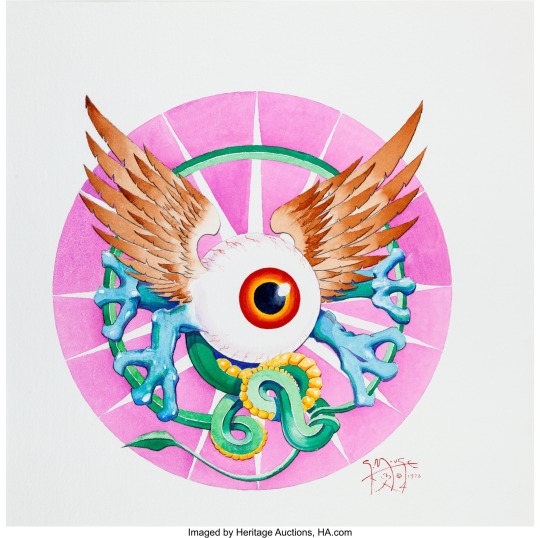
Stanley Mouse "Flying Eyeball" Illustration Original Art (1976) Source
9 notes
·
View notes
Text


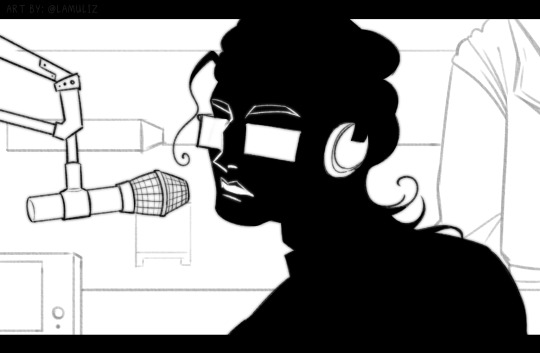

I commissioned @lamuliz to draw her version of the Narrator (Oliver) from The Stanley Parable as the Host from The Kirlian Frequency, and I'm delighted with the results!
(Reference below cut)

#the narrator#the host#the stanley parable#tsp#the kirlian frequency#la frecuencia kirlian#tkf#lfk#art#lamuliz#commission#my mouse is bugging tf out rn and i'm scared
49 notes
·
View notes
Text
Rats rats rats


#tony art#the stanley parable#portal#chell portal#a testing mouse and a lab rat step into a bar#the mouse says nothing because she’s mute and the rat says nothing because he’s also mute
10 notes
·
View notes
Text
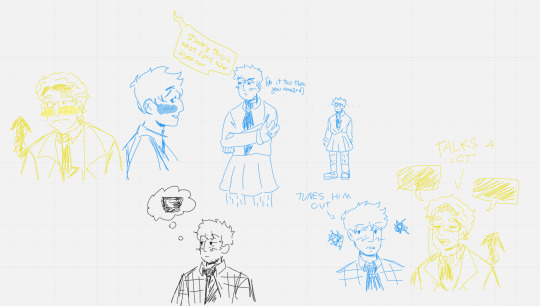
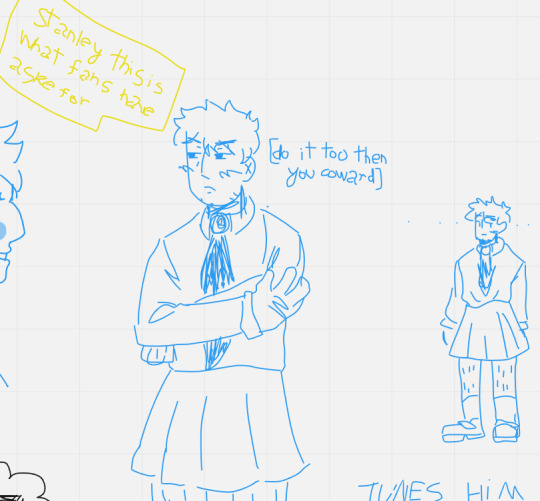

drawing on whiteboard is fun, might do it again
#tspud bucket#tsp#tsp bucket#tsp stanley#tsp narrator#tspud#tspud stanley#tspud fanart#tspud narrator#tspud art#drawing with a mouse is hard#but also really cool#will do it again#im soo normal about them
5 notes
·
View notes
Text

Art I like // Album Art - Journey's Escape (1981)
by Stanley Mouse
0 notes
Text

Quarter Notes: Blurbs & Briefs from Sound Bites
- In this edition: Bobby Whitlock; Dead & Company; the Rascals; & Fleetwood Mac
DOMINO WHITLOCK IN BEALE STREET WALK OF FAME: Derek and the Dominos keyboardist Bobby Whitlock was inducted to the Beale Street Walk of Fame during a May 19 ceremony.
“In all my life, I have never dreamt of being surrounded by and being a part of such greatness,” Whitlock said in a statement carried by American Songwriter magazine. “I am truly grateful and honored to be recognized as a part of Memphis musical history.”
ART EXHIBIT TO ACCOMPANY DEADCO VEGAS RESIDENCY: Las Vegas’ Animazing gallery will host “Visions of the Dead: A Grateful Dead Art and Photography Exhibition,” during Dead & Company’s residency at the Sphere.
Featuring pieces by percussionist Mickey Hart, poster artist Stanley Mouse, photographer Jay Blakesberg & others, the exhibit runs through July 14.
RASCALS BOX SET ON TAP: It’s Wonderful: The Complete Atlantic Studio Recordings, will feature the Rascals’ first four albums in mono and stereo mixes, 14 previously unreleased tracks and single edits across 152 cuts. It’s due May 30.
EARLY MAC COMING BACK: Fleetwood Mac’s early years - the pre-Buckingham-Nicks albums spanning Then Play On through Heroes are Hard to Find - are the focus of Best of - 1969-1974. The 19-track compilation is due July 26.
5/20/24
#bobby whitlock#derek and the dominos#beale street walk of fame#mmerican songwriter magazine#dead & company#mickey hart#stanley mouse#jay blakesberg#visisions of the dead: a grateful dead art and photography exhibition#grateful dead#the rascals#fleetwood mac#mick fleetwood#john mcvie#peter green#jeremy spencer#christine mcvie#danny kirwan#bob welch#bob weston
0 notes
Text

I stumbled on this book in 1975.
Nine years prior, Alton Kelley literally lifted (pocket knife) the lithograph from a copy in the SF Public Library, rare book collection. Kelley and Stanley (Mouse) Miller used it in the famous Avalon Ballroom concert poster.
https://www.rollingstone.com/music/music-features/grateful-dead-original-art-logo-1316160/amp/
Lots of great quatrains about life and death, and many great illustrations.
Great condition. Published nearly 90 years ago.
Make an offer. Not me saw this posted.







#frank zapp#grateful dead#Anton Kelly#stanley mouse#sf art#frank zappa#jam bands#jerry garcia#misictherpy#original photographers#street photography#techno#pho#Alton Kelly
1 note
·
View note
Text
A Deep Dive Into Disney’s Most Underperforming Princess
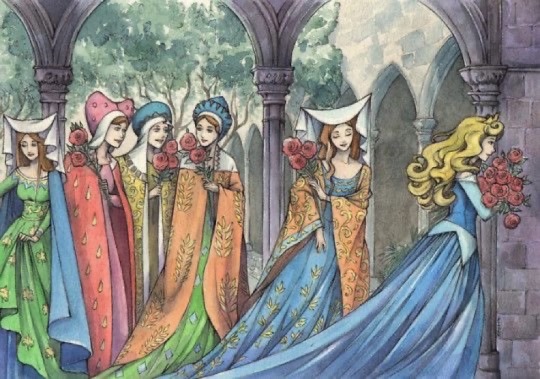
Princess Aurora can’t even be described as controversial. To most, she’s simply boring, too passive, and a continuation of the bland cycle of white princesses who wait around for magic or a prince to save them. Although no one hates her, they find her irritating at the worst, uninteresting at best. In the fifties, they must have thought the same thing. Sleeping Beauty was a commercial failure, and led to company wide annual loss. Sleeping Beauty had followed several other financial flops, such as Bambi and Alice in Wonderland, the latter costing Disney around half a million dollars. Due to her lack of popularity, Aurora may be one of the most neglected Princesses. Many cling to her out of nostalgia, or because she has a nice design, and they find it hard to defend their love for the movie. But the movie’s turbulent history and the amount of detail that went into Aurora herself is what really makes her so incredibly fascinating.
Starting with her design, Disney hired Marc Davis as the supervising animator for Aurora. He also animated Maleficent. The intention was for them to be realistic enough to be placed against the heavily detailed backgrounds of the movie. Davis had embraced this artistic direction, while many of the animators found it, and especially Aurora, laborious and tiring to work on. Both Maleficent and Aurora had to be refined and dynamic. Davis was Disney’s go-to animator for ‘pretty girls’, examples being Tinkerbell and Alice. His knowledge of anatomy and the human body brought both Aurora and Cinderella to life, two of Disney’s most visually iconic characters. Davis had also incorporated Art Nouveau and Art Deco into Aurora’s design, while the tapestry-like art style of the movie was chosen by Eyvind Earle, who was inspired by pre-Renaissance European art. The score and songs were based on Tchaikovsky’s ballet.
Aurora alone required more effort and attention to detail than any princess before her. It took Walt Disney and his team three years to choose a voice actress. They nearly scrapped the project until they discovered Mary Costa, but Disney himself avoided interacting with her in person early on in the project, fearing that she’d influence his vision of the movie.
Aurora was loosely based on her voice actress. Her appearance and her habits (such as gesturing when speaking and singing) were both incorporated into Aurora’s animation. She was also drawn to resemble both her live action model, the same one as Cinderella’s, Helene Stanley, and actress Audrey Hepburn. Davis took inspiration from Audrey Hepburn’s slender physique and elegant demeanour.
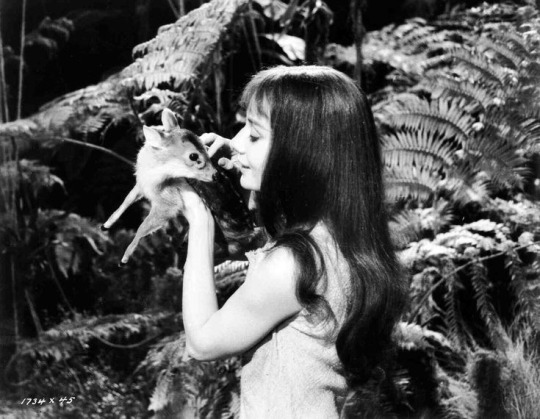
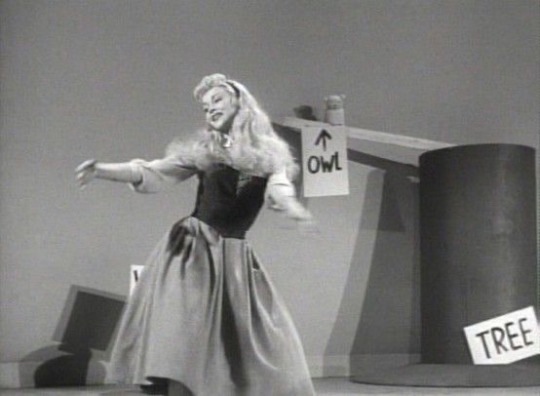
In the book Multiculturalism and the Mouse: Race and Sex in Disney Entertainment, author Douglas Brode referred to Aurora as “a model of modern (50’s) female glamour” and compared her to Brigitte Bardot. He also compared her gown to the work of Christian Dior.

As a character, she was described by Nerve as being “the apex of women who made no choices for themselves.” Aurora is a member of the “Golden Era” of Disney heroines, the original Princess trifecta. Her dreams are the same as those before her. But it’s possible that Aurora’s dreams of true love derived from the need for companionship outside of her three fairy godmothers.
On their website, Disney describes her as, “graceful and kind. She knows that a wonderful future awaits, if you just have the courage to dream it. Aurora enjoys using her imagination and sharing stories with her forest friends. She is also loyal in her relationships -- to her animal friends, her fairies, and her kingdom. Aurora believes in a wish and remains hopeful that she will find the adventure she is looking for.”
Walt Disney himself described Aurora as being “a very layered character/different. She’s calm, yet playful. She has a sense of humour, and she has an imagination.” We can not argue that she was considered layered through the lens of the fifties, because many critics disliked all three of the original princesses for their passive personality, or lack thereof. But from the perspective of the team working on the show, they saw much more to her.
This was the film that Walt Disney worked his hardest on, it took ten years to complete. It was also the very last Princess film he was involved in. Her ‘layers’ were very much intentional. Disney tried to do the same thing with Cinderella.
With Cinderella, they attempted to make her less passive than Snow White, and they showed this through her rebelling against her abusive stepfamily. Maurice Rapf said, "My thinking was you can't have somebody who comes in and changes everything for you. It can't be delivered for you on a platter. You've got to earn it. So in my version, the Fairy Godmother said, 'It's okay till midnight but from then on it's up to you.' I made her earn it, and what she had to do to achieve it was to rebel against her stepmother and stepsisters, to stop being a slave in her own home. So I had a scene where they're ordering her around and she throws the stuff back at them. She revolts, so they lock her up in the attic. I don't think anyone took (my idea) very seriously."
The toned down version of Cinderella, although rebellious in her own way, is still toned down. That part of her character was written out. In comparison to what she would have been, she is passive. Aurora and Cinderella are both less passive than their predecessors, but passive nonetheless. All three of them are the staple damsels in distress.
However, Mary Costa described Aurora as “very strong”, citing her urge to defy her guardians as a display of independence and an example of her strength. Aurora was raised by three women, and had never met a man in her life. Costa believed that because of this, she was ‘innately romantic’ as opposed to lonely or depressed with her sheltered life. To quote, “there was a certain part of her that maybe she didn’t realise, that was just so romantic and maybe expecting something that–she didn’t even know what.”
She believed that her being raised by three older women rather than her parents made her “a little bit older, and yet, she…had this young, outreaching spirit.” Author Douglas Brode points out that the fairies’ independent raising of Aurora mirrors “precisely that sort of women’s commune numerous feminists experimented with throughout the seventies.” Aurora living in an isolated, female-only space, with female authority, is reminiscent of the bold and liberating radical feminist movement. In her own way, as a peasant, she was independent. And that independence and autonomy was taken from her upon discovering that she was royalty and betrothed to a prince. She was leaving her home and the presumed man of her dreams behind, and not of her own free will.
Aurora had enjoyed her simple life, it had fulfilled her, even if she desired more. She had dreams of finding romantic love, which she talks about in the movie’s song ‘I Wonder’. Additionally, her close relationship with animals demonstrates her loving and kind personality. She has a whimsical imagination, and it’s scenes like the ones from Disney’s Enchanted Tales series and ‘Once Upon a Dream’, that would support Costa’s claim of her being a romantic. Where she’s changing in and out of pretty gowns with a magical wand, and giggling to herself. Or dancing happily with the forest animals, thinking about her imaginary prince. In ‘Keys to the Kingdom’, she proudly sings about wishing to make decisions with her heart.
Her independence is demonstrated on multiple occasions in Disney’s discontinued Enchanted Tales: Follow Your Dreams. Aurora graciously accepts responsibility of her kingdom while both her and Philip’s parents travel away for a business trip. All on her own, she is determined to get all of her Princess duties finished on time, the hard way. She refuses to take the easy way out, time and time again, even when she doubts herself. She works harder than even her father, who would take the easy way out by signing royal documents without reading them. Even when Meriwether gives her a magic wand to help her out, she reads and fills out every royal form diligently, and helps out all of her subjects. She manages to complete her tasks on time and throw a banquet for her family and Philip by the time they return. The lesson here is to ‘stick to it’ and to ‘persevere’. But her insistence on doing everything on her own is shown once again in A Kingdom of Kindness, where she must plan a surprise party for Philip. The three fairies attempt to help her, but she continues to tell them that she wants to do it on her own. This series was cancelled, and it is difficult to find any clips of it online. But this short-series gives us some insight into Aurora’s character.
She is assumed to be the protagonist by most, but many consider the three fairies to be the protagonists. They help move the story along, they protect Aurora, and they have distinct, in-your-face personalities. Many consider Aurora authentic, or the title character, but whether she is the protagonist or not has never been agreed upon. Her lack of role in the story has been criticized by many. But some take it as an allegory for the lack of control
The most lengthy debate surrounding Aurora has to do with how feminist her character is. She may have been an improvement from the previous princesses, but she is not regarded as a particularly feminist character.
The three original princesses, all being pale-skinned European princesses with a naive and endlessly forgiving (an unrealistic standard), sends a message to their viewers that this is what princesses should look like, how they should behave. All three classic princesses are deeply intertwined with Disney’s long history of racism and bigotry. In an attempt to amend this, Disney has released back to back live action remakes of their movies, all receiving mixed reviews. Maleficent was Sleeping Beauty’s remake, focused on a maternal relationship between Maleficent and Aurora. Many people interpreted the scene where Maleficent’s wings get cut off in her sleep as sexual assault. This inclusion made many survivors of sexual assault feel represented by the character.
From my perspective, the original Sleeping Beauty is technically a movie centred around women. A teenage girl lives with her three surrogate mothers, who end up saving her in the end from the female antagonist. Although Prince Philip’s role in the story is still a large part of what moves the plot along. It is Philip who is captured, as Maleficent knew that he would go looking for her. He courted Aurora, defeated Maleficent with the help of the three fairies, and kissed the princess awake. But he still doesn’t get as large of a role, or nearly as much screen time, as the three fairies.
In short, both the movie and the princess fascinate me. And although there is depth if you squint, a character does not need to be fleshed out to be lovable, or at least endearing. Aurora is my favourite Disney Princess, and I find the history behind her and the film to be more interesting than what meets the eye.
#disney#princess aurora#my girl!!!#sleeping beauty#show white#classic princesses#cinderella#walt disney#analysis#disney analysis#essay#feminism#mina loves disney
248 notes
·
View notes
Photo

Steve Miller Band’s Book Of Dreams, 1977. Cover art: Alton Kelley and Stanley Mouse
580 notes
·
View notes
Text
im a wolf-demon-salamander-grey treefrog-katydid-cricket-luna moth-klingon-trad vampire-cat-romulan-harry potter wizard-gnome-drow-orc-wood elf-high elf-werewolf-twilight vampire-chihuahua-android-bard-druid-sorcerer-d&d wizard-lotr wizard-mind flayer-kraken-owlbear-genetically modified human-andes mint-harry potter merperson-h20 mermaid-great white shark-raven named nevermore-amontillado-sewer clown-animatronic-ink person-reality bender-ringwraith-chicken-fairy-telescreen-multibear-manic pixie dream girl-d class-horcrux-dragon-unicorn-pegasus-among us crewmate-among us imposter-game master-sharpie king size marker-dwarf-dragonborn-toothbrush-rock-paper-scissors-lizard-vulcan-politician-god-phone guy-icebreakers ice cubes pineapple-a doctor not a miracle worker-troll-ent-poodle-rabbit-Bear.-orange zombie-purple zombie-green zombie-professor plum-col. mustard-in the library-with a knife-hoola dancer-fish-villager-pelecan-defense against the dark arts professer-mafia boss-peep rabbit-peep chicken-gymnast-hairbrush-philosopher-music freak-school teacher-kidnapper-police lieutenant-farmer-trash can-dumpster out back-turtle-tribble-my little pony-kratt brother-high diver-pearl diver, dive, dive, deeper-chef-fire-earth-water-wind-wasp-bee-hornet-yellowjacket-mud dabber-grasshopper-rattlesnake-armadillo-cowboy-flashlight-starfleet science officer-harlet-elephant-gater-muppet-emo-goth-preppy-teabag-loser-sucker-mouse-rat-a puppet-a pauper-a pirate-a poet-a pawn-and a king-father albert-the pope-a nun-pastor jeff-gambler-metalhead-death rocker-the grim reaper-angel-lighthouse-paw patrol dog-hobbit-starfish-sponge-crab-squid-shrimp-jellyfish-chipmunk-hammerhead shark-nurse shark-humpback whale-blue whale-orca-sexual harrassment panda-south park character-jakoffasaurus-scrabble board-ouija board-pillow-toilet paper-period pad-tampon-baby diaper-elderly diaper-martian-touch tone telephone-starfleet operations-starfleet command-kirk-spock-bones-sulu-chekov-uhura-scotty-yeoman rand-KHAN!!!-mudd-the uss enterprise-the uss reliant-botany bay-v'ger-valeris-saavik-sybok-surak-sarek-the abbreviation 'idk'-sheldon-leonard-penny-howard-raj-amy-bernadette-mary cooper-george sr-george jr-missy cooper-meemaw-tam-dr sturgis-dr linkletter-dr jack bright-dr clef-dr gears-dr kondraki-dr mann-dr iceberg-dr crow-dr rights-dr sherman-scp 049-scp 3008-scp 4231-scp 166-scp 682-scp 2521-scp 590-O5 6-bill cipher-stanley pines-stanford pines-dipper-mabel-wendy-soos-schmebulok-gideon-mcgucket-dipper goes to taco bell-sheriff blubs-deputy durland-tad strange-andy taylor-william afton-michael afton-elizabeth afton-crying child-henry emily-charlotte emily-dave miller-jack kennedy-dee kennedy-peter kennedy-steven stevenson-aragorn-sam-frodo-merry-pippin-boromir-legolas-gimli-gandalf-faramir-denethor-sauron-elrond-thranduil-harry-hermione-ron-voldemort-pettigrew.-moony-padfoot-prongs-snape-edward-bella-alice!!-carlisle-charlie-cthulhu-greg heffley-pennywise-bendy-sammy-norman-jack-alice (susie)-allison-henry stien-joey drew-bruenor battlehammer-raskolnikov-heather-heather-heather-veronica-jd-kurt-ram-martha-kurt cobain-david bowie-freddie mercury-hozier-mitski-lemon demon-jack stauber-tally hall-hamilton-burr-jefferson-madison-washington-phillip-angelica-eliza-peggy-king george iii-king henry viii-ben franklin-catherine of aragon-anne boleyn-jane seymour-anne of cleves-katherine howard-catherine parr-dracula-𝓯𝓻𝓮𝓪𝓴𝔂-evan hansen-conner murphey-john adams-raymond barron-fred randall-jane doe-ocean-noel-mischa-constance-ricky-karnak-vergil-alternate-thatcher davis-ruth-dave-cesar-mark-adam-sarah-jonah-evelyn-gabriel-trump-biden-sunny-basil-kel-aubrey-hero-mari-vanessa (the mean girl that kinda likes u)-tux the linux penguin-perry the platypus hybrid princess...dont fw me
#this took an hour#lord of the rings#lotr#star trek tos#star trek#harry potter#marauders era#gravity falls#dipper goes to taco bell#heathers#hamilton#1776 musical#dear evan hansen#the hobbit#six the musical#ride the cyclone#fnaf#dsaf#inanimate object#i forgor#scp#scp foundation#everybody loves raymond#the big bang theory#young sheldon#howard your froot loops are getting cold!#denethor hate club fuck that guy#other fandoms#dungeons and dragons#d&d
61 notes
·
View notes
